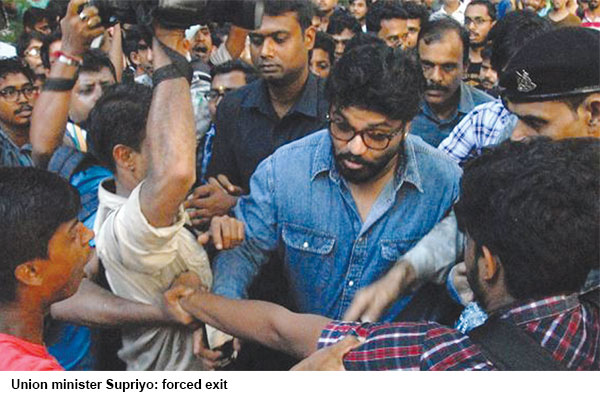
Since 2011 when the Trinamool Congress (TMC) led by firebrand Mamata Banerjee was swept to power bringing 34 years of uninterrupted rule over the populous (91 million) eastern seaboard state of West Bengal of the CPM (Communist Party of India-Marxist)-led Left Front government to an ignominious end, Banerjee’s poriborton (revolutionary change) promise has not been fulfilled. Capital flight, corruption scams and campus violence — the legacy of toxic Marxist rule – continues in West Bengal.
As if to compound the mess, on September 19, students of Jadavpur University (JU, estb.1955) — one of the few surviving excellent higher education institutions in the state and a CPM stronghold — kicked up a huge ruckus while protesting the entry of Union minister of state for environment, forest and climate change, Babul Supriyo into the JU campus. Supriyo had been invited by the Akhil Bharatiya Vidyarthi Parishad (ABVP), a pro-BJP students union, to deliver a lecture. The protesting students refused to permit Supriyo, described as a “fascist”, to enter the university’s campus.
Supriyo was shown black flags and allegedly heckled by some JU students, prompting West Bengal governor and ex-officio JU chancellor Jagdeep Dhankhar to rush to the campus only to be jointly heckled by the agitators. After the forced exit of Dhankhar and Supriyo under police escort from the campus, ABVP students vandalised JU’s pro-CPM Arts Faculty Students Union (AFSU) office, burnt and destroyed campus property and pelted stones at agitating pro-left students. Subsequently, AFSU filed a police complaint against Union minister Babul Supriyo and five ABVP members for assault and vandalism.
On September 20, the Jadavpur University Teachers’ Association (JUTA) joined the fray and accused Supriyo of making “highly provocative gestures” during the students protest. JUTA also “condemned” Supriyo’s alleged disrespect of vice chancellor Suranjan Das. The teachers’ association described the campus violence as a deep-rooted conspiracy of the BJP to “vitiate the liberal atmosphere of JU” and expressed complete solidarity with vice chancellor Suranjan Das, who had refused to call the police to the campus despite Supriyo’s insistence. Making common cause with protesting AFSU students and JUTA, chief minister Mamata Banerjee blamed BJP and ABVP for the campus violence.
According to informed — and increasingly alarmed — monitors of the chaos on West Bengal’s college and university campuses, this spurt of violence is the outcome of intense competition between student wings of TMC and BJP to dominate JU, a long-time stronghold of CPM students unions such as SFI (Students’ Federation of India), the Left-leaning AFSU and FETSU (Faculty of Engineering and Technology Students Union). One of West Bengal’s few surviving islands of higher education excellence, JU has overtaken higher ed institutions in Bengal in most media and official university rankings.
Although ABVP, in the wake of the BJP experiencing a surge of popularity following General Election 2019 in which it bagged 18 of West Bengal’s 42 Lok Sabha seats, has won student union elections in smaller colleges and universities, it has failed to penetrate the country’s major institutions such as Hyderabad Central University, Jawaharlal Nehru University and now Jadavpur University. The consensus of opinion in academia is that it will be tough for ABVP, which is reliant on intellectual lightweights of the RSS, to make much headway in JU.
“Even though the CPM and left parties have been almost extinguished in West Bengal, higher education institutions remain the strongholds of the CPM and Left Front despite the best efforts of TMC and BJP. Frustrated TMC students unions with tacit encouragement from the TMC leadership are attempting to seize university campuses by force. That’s the prime cause of campus violence,” says a JU liberal arts professor who prefers to remain anonymous.
However, in this race for political control of West Bengal’s colleges and varsities, the collateral damage is a steady second exodus (following the first during Left Front rule) of faculty and students from the state’s institutions of higher education. If this continues, West Bengal — the birthplace of scholars such as Iswar Chandra Vidyasagar and Rabindranath Tagore — might go down in history as a classic example of how puerile politics can waste the intellectual capital of even well-educated states.
Baishali Mukherjee (Kolkata)























